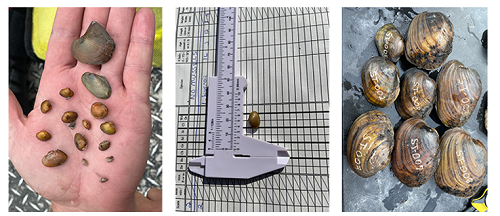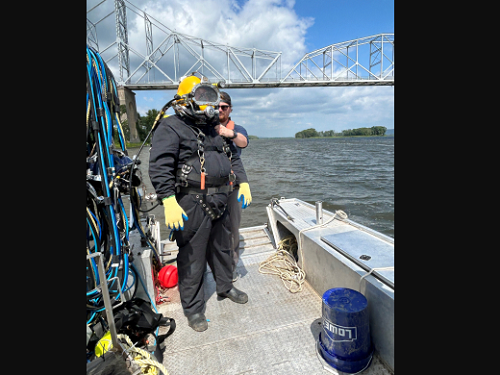In a recent blog post, the Iowa Department of Transportation explained the long-term reasons why more than 140,000 mussels were relocated in 2016 from the waterway around a then-new Mississippi River crossing undertaken in partnership with the Illinois Department of Transportation – as well as a from a more recent bridge building effort conducted with the Wisconsin Department of Transportation.
[Above photo via the Iowa DOT]
In the post, Jill Garton of Iowa DOT’s Location and Environment Bureau said that mussels are waterway cleaning agents, functioning much the way the liver does in terms of removing toxins from a human being’s bloodstream.
“Freshwater mussels impact water quality,” she noted. “When you have mussels in an area, they filter impurities in the water and improve the health of the ecosystem. Without those filters, the water quality can degrade pretty quickly, putting other species at risk.”

Because mussels are sedentary creatures and can’t move out of the way when something disrupts their bed, Garton said they need to be physically moved to save them from being crushed by construction equipment. When the new bridge is finished and in place, the mussels are then relocated back into the area to continue their work as filters for river impurities.
Iowa DOT noted that it learned a lot about safely relocating mussels when building a new crossing for Interstate 74 over the Mississippi River in 2016; experience drawn upon several years later when it worked with the Wisconsin DOT to build a new highway crossing over the Mississippi River connecting Lansing, IA, to Crawford County, WI.
While Garton pointed out that it “sounds pretty simple to just pick up a bunch of mussels and move them,” in reality, the relocation process involved several federal and state agencies. And, for the Wisconsin crossing project, since at least one species of mussel is on the endangered list, more factors came into play – such collecting the 30,000 mussels found in the area of that bridge project so they could be weighed, aged, tagged, recorded, and relocated.
“Strong working relationships with the agencies, our consultants, and our internal Iowa DOT colleagues made preparation for and completion of the relocation possible,” she noted.
“The Iowa bank of the mighty Mississippi River in this area is home to an even larger mussel bed than we anticipated, but with a lot of long hours by all involved, we did it,” Garton added. “Completing the successful relocation of the mussels not only met our environmental commitments under law but provided us with the satisfaction that we are protecting the environment that many of us enjoy in our free time outside of work.”
 States
States
TxDOT Updates Artificial Intelligence Strategic Plan
February 27, 2026 States
States

